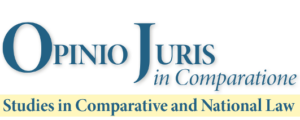ANTITRUST POLITICAL SIDE
Authors: Andrea Piletta Massaro
ABSTRACT
The 2021 Juris Diversitas Conference’s topic was ‘The Dark Side of the Law’ and the aim of this article is that of exploring the ‘dark side’ of competition law. This discussion, as we will highlight below, is of particular importance in the current social and economic scenario, characterised by the rise of the so-called ‘tech giants’ and by the transition towards a more sustainable economy. Competition law, especially from the 1970s to the present days, has been viewed as a highly technical – and often technocratic – discipline, with its broad law provisions filled by the fundamental intervention of economic analysis. Of course, this view is correct, but it may result oversimplified. Indeed, competition law has a very deep ‘dark side’, which lies in its political foundations. This characteristic of antitrust law is particularly evident in the U.S. experience, but cannot be ignored also in the European context. Moreover, recently adopted competition law regimes, such as the South African one, have a strong political imprinting.1 In fact, as every legislation, competition law follows a policy direction, which is rooted into the constitutional dimension of every legal system. This concept has been brilliantly exemplified by the ‘sponge’ figure proposed by Professor Ariel Ezrachi.2 Moreover, the issues which are dealt with by competition law, often implying fundamental choices of economic and industrial policy, render this political side paramount in the interpretation of antitrust statutes. Anyhow, for the sake of clarifying, we are not suggesting here that competition law shall be guided by politics, this would be a major mistake. However, we are sustaining that the ‘revolution’ advanced by the so-called Chicago school has – in the words of Professors Stucke and Steinbaum – ‘hijacked’ competition law from its roots.3 In particular, the focus on economic efficiency has often led to a failure in including a broader set of elements into the assessment of potentially anticompetitive conducts. This, as a consequence, has moved away the antitrust discipline from its constitutional background, which is very different from the political realm. Thus, what we are suggesting is to recalibrate the interpretation of competition law into its foundational dimension, that, as we will demonstrate, can be found – with some needed specification that will be delivered below – in the primary concept of liberal systems: Economic freedom.
Finally, a correct understanding of the goals of competition law other than those identified by neoclassical economic thinking might prove essential to find the better solution in order to tackle the ever-increasing market power exercised by tech giants, which, as suggested especially by Tim Wu, closely resembles the big trusts which led to the enactment of the first – and still most famous – modern antitrust statute, the Sherman Act. In particular, Professor Wu draws a parallelism between the 1800 fin de siècle ‘gilded age’ and the current ‘new gilded age’.45 Only if we understand in depth the soul of competition law, we would be able to fine-tune tools that can be effective in challenging the current market concentration rates. Of course, antitrust shall not be seen as a cure for every disease, but, as we will see, some outstanding economics scholars sustains that a reduction of the current levels of market power may prove beneficial in reducing negative outcomes such as, for instance, increasing income inequalities.
Given this introduction, which summarises the gist of our arguments, this contribution will be articulated as follows: The first part will deliver an insight into the foundations and the evolution of U.S. antitrust law. The same will be carried out with reference to EU competition law in the following part. The third part will establish a link between market concentration and inequalities ant it will suggest some policy changes in order to refine the application of competition law vis-à-vis the ‘new gilded age’ scenario. Then, conclusions will be drawn.
Keywords: Antitrust - Competition Law – Policy - Comparative Law - Market Powerti

